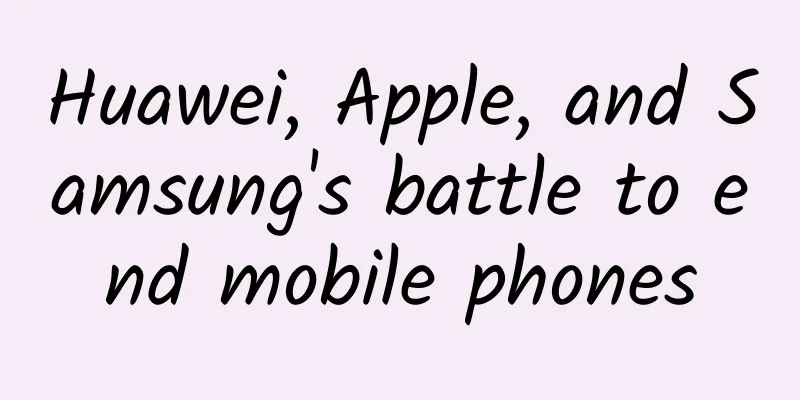Huawei, Apple, and Samsung's battle to end mobile phones

|
In the past 10 years, the rapid popularization of smartphones has changed the way most people in the world live and work. Behind this change, the positive role played by technology giants such as Apple, Samsung and Huawei cannot be ignored. Samsung's role is particularly important. After 2011, Samsung's share of the global smartphone market has surpassed Apple's. With an annual shipment of 200 to 300 million units, its influence continues to spread among billions of users around the world. Considering only the shipment of smartphones, Samsung has been the undisputed leader in the global market for the past nine years. Since 2012, Samsung's share of the global smartphone market has greatly surpassed Apple, and in 2013, its market share was more than twice that of Apple. At the same time, as the advantages of the Android system were thoroughly established, Nokia, Blackberry, and Motorola were eliminated from the market in an instant, and Samsung, holding high the Android banner, even saw its market share soar to more than 30%. For a while, Samsung could not find a rival in the global smartphone market. However, in recent years, with the rise of domestic mobile phone manufacturers such as Huawei, the market position of Samsung and Apple has been continuously impacted, and their market share has declined significantly. In particular, Canalys, IDC, and Counterpoint, three authoritative research institutions, recently reached a unanimous conclusion: Huawei surpassed Samsung for the first time and became the world's highest-shipping mobile phone manufacturer in the second quarter of 2020. Huawei's shipments exceeded Samsung, directly breaking Samsung's invincible market myth in the past 10 years. Samsung mobile phone crown falls This is the first time in 10 years that Samsung's smartphone market share has been surpassed by a manufacturer other than Apple. Before 2010, the global mobile phone market was dominated by Nokia. After the release of iPhone in 2007, Apple's market share rose rapidly. In the few years from 2007 to 2010, Apple's market share was far from comparable to Samsung. However, after Jobs passed away in 2011, Apple was unable to maintain its suppression of Samsung. Under Samsung's multi-series product "sea of machines strategy", it didn't take long for Apple to be overtaken by Samsung in the mobile phone market share. Since 2012, Apple's market share has only briefly surpassed Samsung in the few quarters when new models are released. Its market share in other periods is also unable to match that of Samsung. Samsung has been the world's number one smartphone manufacturer for nearly a decade, and its competitiveness has been tested by time and the market. It goes without saying how difficult it is to defeat such a strong rival. But Huawei has done it. IDC data shows that in the second quarter of 2020, Huawei's smartphone shipments fell 5.1% year-on-year to 55.8 million units, accounting for 20% of the global market; in contrast, Samsung's smartphone shipments fell 28.9% year-on-year to 54.2 million units, and its market share in the global market fell to 19.5%. For the first time in recorded history, Huawei's smartphone shipments have surpassed Samsung. Canalys and Counterpoint also reached the same conclusion. Although these three authoritative data agencies unanimously believe that Huawei's market share exceeds Samsung's, it is only because China has been the first to recover from the global epidemic. They also predict that after the global epidemic is alleviated, Samsung's smartphone shipments will rebound quickly and surpass Huawei. But first of all, it should be made clear that Huawei's market share surpassing Samsung is not entirely due to the peculiar market environment brought about by the epidemic. Huawei's overtaking is no fluke At the beginning of 2016, Yu Chengdong made a bold prediction: Huawei's mobile phone sales will surpass Apple within three years and Samsung within five years. According to Huawei's performance in the global market at that time, Yu Chengdong's statement was not very credible. In 2015, Samsung, Apple and Huawei held 22%, 16% and 7% of the global smartphone market respectively. In other words, Huawei's market share was less than half of Apple's and less than one-third of Samsung's. However, it now seems that Huawei has indeed fulfilled its original prophecy. The reason why Huawei can do this is actually the result of the dual effects of internal and external factors. Let’s talk about the internal factors first. Huawei has surpassed Samsung in just a few years. To put it simply, it is because of its unremitting efforts in technology, brand, channels and other aspects. For example, Huawei's strong investment in technology is the key prerequisite for its continued improvement in competitiveness. Huawei's self-developed Kirin SOC chip design and the launch of Kirin 910 in 2014 have enabled Huawei to achieve core autonomy and cross the biggest threshold of becoming a top smartphone giant. In the past one or two years, with the commercialization of 5G communication technology around the world, as a technology company with the most available 5G patents, Huawei's smartphones have also been increasingly popular. Only by persisting in improving its internal strength in technology, brand, channels, etc., can Huawei truly have the possibility to compete with Apple and Samsung and defeat them. Looking at external factors, Huawei's ability to overtake Samsung ahead of schedule is closely related to the fatal mistakes made by Samsung itself. After the battery scandal in 2016, Samsung's global brand image was negatively impacted. The different treatment of Chinese consumers made its reputation in the Chinese market plummet. Before that, Samsung's market share in China had been declining due to the impact of domestic mobile phone manufacturers. In 2017, when the battery scandal continued to spread, Samsung's market share plummeted to 2.2%, and in 2018 it fell to 0.8%, almost withdrawing from the Chinese market. The reason why Samsung suffered greater losses due to the epidemic is mainly because it lost the support of the Chinese market. In the first half of this year, China's smartphone market was more critical than other regions because it was the first to recover from the epidemic. According to Counterpoint data, China accounted for nearly one-third (31%) of global smartphone shipments in the second quarter. Because Samsung almost withdrew from the Chinese market, it suffered such heavy losses in the second quarter, with the largest drop of 28.9% among the top five global smartphone manufacturers. In short, with Huawei's own efforts and the support of its peers, it is only natural that it can fulfill its original predictions. However, Huawei's ability to overtake Samsung ahead of schedule was indeed greatly affected by the accidental impact of the epidemic. As a result, we cannot ignore the possibility that Samsung will overtake Huawei in the second half of this year or next year. What are the chances of Samsung's comeback? Just as the three major international data agencies predicted, there is a high possibility that Samsung will regain the crown of smartphone sales. On the one hand, the global market environment is currently unfavorable to Samsung, but this adverse impact is gradually fading. Although Samsung's market share in the Chinese market is very low, the brand influence of the "Android King" has not been excessively weakened. In the eyes of some Chinese consumers, Samsung phones are still the best Android phones. In the first half of this year, Samsung's domestic market share reached 3.1%, a sharp rebound from 0.8% in the whole of 2018. Although the epidemic has recurred in other regions outside of China, more and more countries have begun to accept coexistence with the epidemic and resume economic operations. On the other hand, Huawei's competitiveness in technology, brand, channels, etc. has not yet substantially surpassed Samsung. Especially in the field of technology, after Intel delayed the 7nm process again, Samsung Electronics became the only IDM wafer factory in the world that mastered advanced process technology, and is currently the only chip manufacturer in the world that can compete with TSMC in 5nm advanced process technology. Its own 5nm SOC can complete everything from R&D design to production and manufacturing to packaging and testing, unlike Huawei, which is controlled by others. For now, unless Samsung makes another mistake, it will be relatively easy to regain the crown of smartphone sales. The final battle for smartphone supremacy The recent battle for supremacy between Huawei and Samsung in the smartphone market is crucial for both parties, and this may also be the last battle for supremacy in the smartphone market. Affected by the international situation, the global smartphone market is also full of uncertainties. For example, to what extent will Europe and the United States be unfriendly to Chinese technology companies? Can Chinese mobile phone manufacturers continue to maintain their market share in the Indian market? How will Huawei solve the SOC problem after paying Qualcomm a high licensing fee of US$1.8 billion? But among a series of uncertainties, there are also many certainties. These certainties determine that the importance of this battle for hegemony cannot be ignored. A key point is that the 5G era has arrived and its commercial applications are accelerating. The transition from 4G to 5G will be no less than the transformation from 2G to 3G. At the intersection of the 5G era, the battle between Huawei and Samsung can determine who will have more first-mover advantages in the 5G era. The large-scale popularization of 5G also means that the mobile Internet era will gradually transition to the Internet of Things era. In the Internet of Things era, the status of smartphones may degenerate from core terminals to important interactive entrances, but this also means that the terminal ecology of the Internet of Things era will be built. After this battle between Huawei and Samsung, the fierce battle for smartphones may come to an end, and more exciting competition in the Internet of Things ecosystem will take its place. |
Recommend
What kind of people do mosquitoes love the most? The truly effective way to kill mosquitoes is...
“The opposite of love is not hate, but ignoring.”...
Foreign beauty birthday blessing video private custom shooting
What I want to introduce to you today is the late...
Rocket: I want to fly...higher!
China Space Day Special The Road to Flying It'...
Chrome extension Safe Browsing service can prevent homepage tampering
Google recently announced that it will expand the...
The sales target of Xiangjie S9 this year is 60,000 units. Is this the only battle that will determine the success of BAIC Motor, which suffered a loss of 25 billion yuan?
"This car competes with the Mercedes-Benz S-...
4 types of short video user psychology to help you create short video content
The surface research of short video "content...
The higher this index is, the greater the risk of Alzheimer's disease! Stick to these 4 good habits and get benefits early
Reviewer of this article: Wang Wenxiang, Professo...
Financial Times: Electric car sales in Europe exceeded diesel car sales for the first time in December 2021
While many new electric models are attracting con...
Do you want to stay young by supplementing collagen? Wake up!
Who doesn't want to look young and youthful? ...
Check yourself! Be careful if your fingers have this condition, it may be your heart calling for help...
Reviewer of this article: Yang Shi, Associate Res...
A boy died of rabies despite being vaccinated. Is the “vaccine ineffectiveness theory” coming again?
Recently, a boy in Nanyang, Henan Province was bi...
Magic Leap finally officially announced its first headset! Can $2 billion plus six years of research and development rebuild market confidence in AR?
Finally, Magic Leap, an augmented reality startup...
iPhone 6 locked remotely: Don't use it if you don't pay
I just bought an iPhone 6, but it was suddenly lo...
Analysis of Tmall Double 11 event operations in 2019!
This article attempts to analyze the overall game...
Multi-style card stacking view--ZLSwipeableViewSwift
Source code introduction: It can realize the card...









